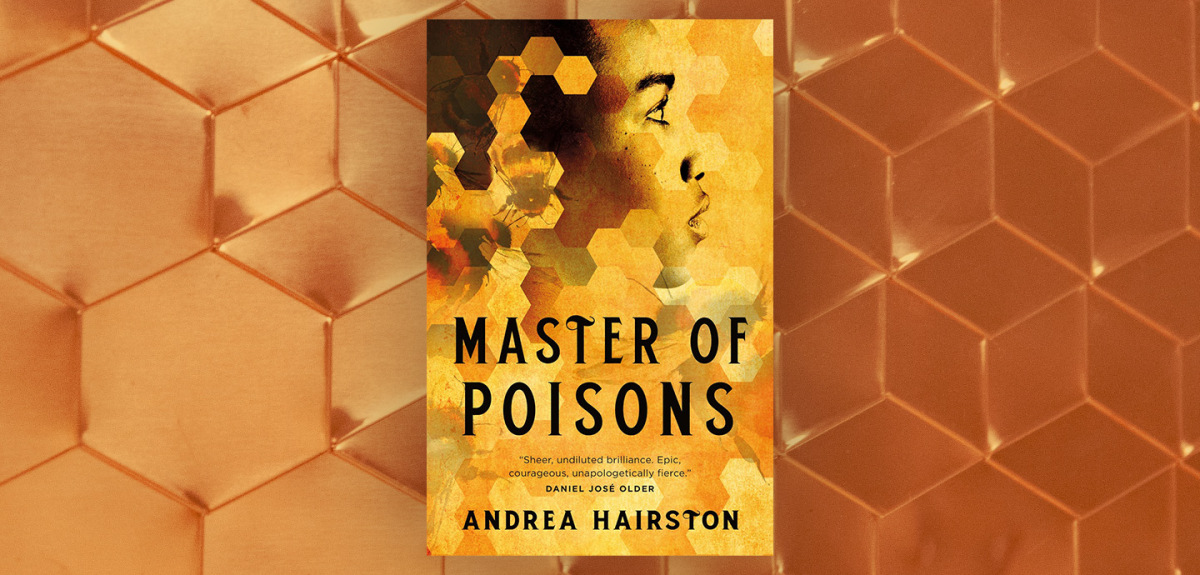[ad_1]
Approaching a genre for the first time is like learning a new language. Sifting through the impenetrable for words you understand, learning the conventions and tropes as one would nouns, adjectives, and verbs. And while most start with simple phrases, others take on ambitious, intimidating projects and throw themselves in headfirst. I, a new reader of high fantasy, did the latter with Andrea Hairston’s Master of Poisons. And while the novel veered off into twists and turns, revealing innumerable details, the result was clear, satisfying, and fruitful.
The novel opens the urgency of an impending climate crisis, the political intrigue of a corrupt empire, and the deep-seated tensions between disparate cultures and tribes. We are introduced to Djola, the titular Master of Poisons, who has claimed the Arkhysian Empire as his home, though his people hail from the spiritual northlands. He is tasked with solving the poison desert, which obliterates crops and plunges people into starvation. His task becomes an exile of years, traversing pirate ships, spies, errant magic, and the constant weight of his family and people atop his shoulders. Djola must master the spell of all spells, conquering aspects of himself in the process, and hope that this miracle can be enough to save the land he loves.
Meanwhile, we are also introduced to Awa, a child who trains as a griot, or storyteller, reveling in traditions maligned by the empire. As she grows we learn she has an affinity for wild beasts, namely bees, dogs, and warhorses, and this connection to the natural world only furthers her survival. For much of the novel Awa’s goal is simple. To survive a world that deals her one bad hand after another. When her path crosses with Djola’s, it is clear that her collected nature contrasts his fiery one, and it becomes clearer still that the two must work together to accomplish anything lasting in this world.
There is much to admire in Master of Poisons. Close relationships between characters throb with passion, even when given little time to develop. This is spurred on by Hairston’s most compelling creation, Smokeland, a place where spirits can wander while “breath bodies” are left vulnerable. Not every character can experience Smokeland, but those that do are aware of both its perils and allure.
Additionally, gender dynamics play a powerful role. Why don’t powerful women, masters of their mountains and of conjure, have a seat at the council tables? Why do vesons, those who identify as neither men nor women, face relentless persecution? Hairston blends these ideas seamlessly into her created world. Intersections abound as well, with maligned minorities and older ways of life frequently at odds with the rules and regulations of the Empire. The novel is at its best in its quiet moments, when Djola and Awa’s narratives intertwine, and long-held emotions and confessions are brought to the forefront. In a war-torn landscape, with hardly a moment to breathe, these quiet moments are a place of refuge.
Where I, as a new fantasy reader, fell short was in understanding the details of the world as a whole. Many times I read a language or societal role, never quite internalized its significance, and found it come back over and over again and reminding me of my lack of understanding. For instance, we’re given an understanding of a tribal hierarchy, of a societal reform that characterizes certain groups as barbarians and others as civilized, but given little historical context as to how this arose. Yet these hierarchies are referenced numerous times, reminding us that this is a novel of decolonization. Hints given are few and far between. Hairston’s worldbuilding is complex, frequently layered, and to look for a simplistic, clean-cut magic system is to search fruitlessly.
While we’re frequently reminded of Xhalan Xhala, spell of all spells, its true significance and origins remain murky and difficult to interpret. Part of the overall confusion I attribute to my own lack of experience in new worlds. Yet I am left to wonder if the novel being so grand in scope could have focused more time in developing the characters and their relationships to one another. More moments of levity, to break from the tension. More frequent reminders of when all is lost, what these characters are ultimately living for. More moments of humanity.
However, at its core, Master of Poisons is a novel of folklore, of corruption, of both reclaiming tradition and starting anew, and honoring myriad voices in society (the powerful and marginalized). One can delight in the multifaceted worldbuilding, the many languages and threads of folklore, and the blending of the real world and the spirit world. For new fantasy readers, the novel is ultimately grounded in all too familiar themes, those of acceptance, survival, and justice. Themes we, especially those most marginalized in our communities, can recognize at once.

Fiction
Master of Poisons
By Andrea Hairston
Tor.com
Published September 8th, 2020
[ad_2]
Source link
